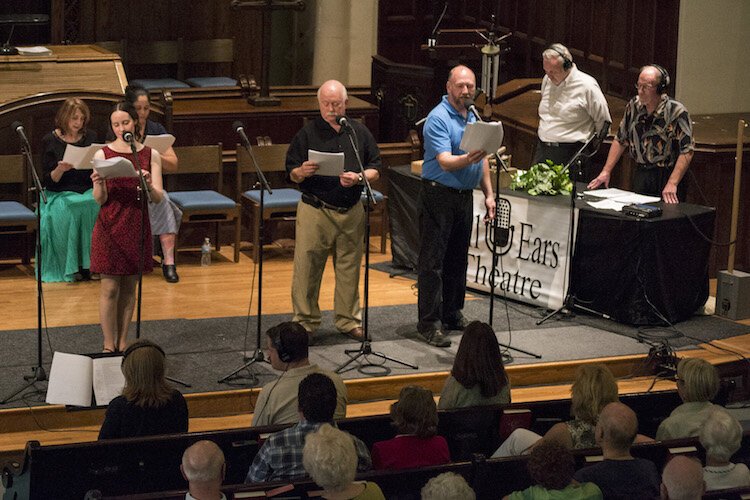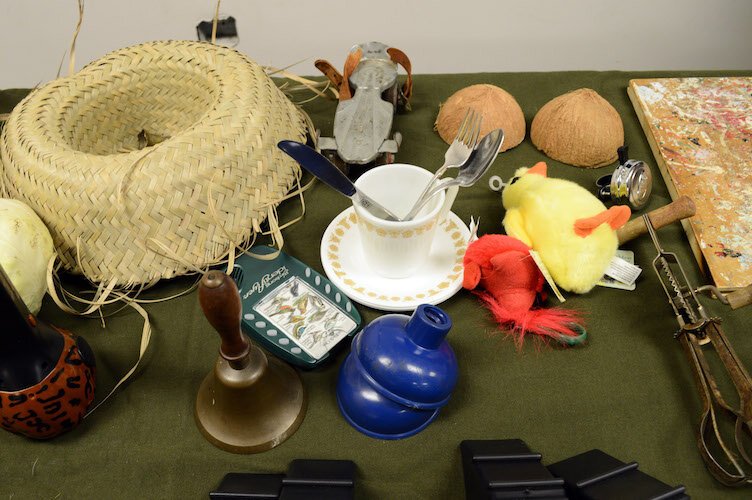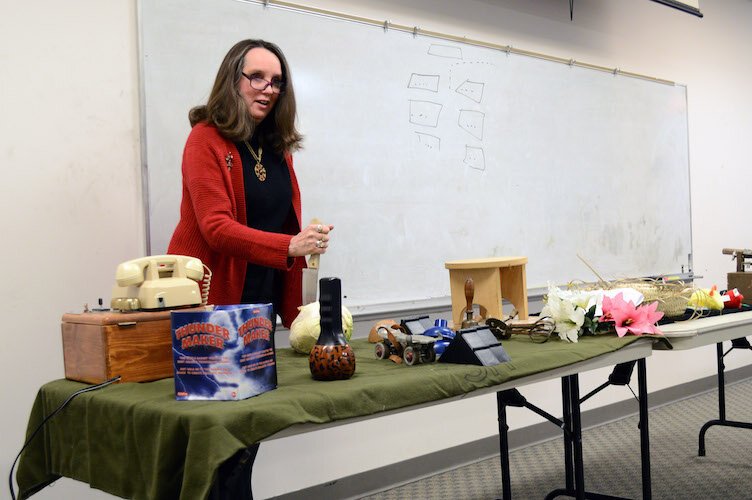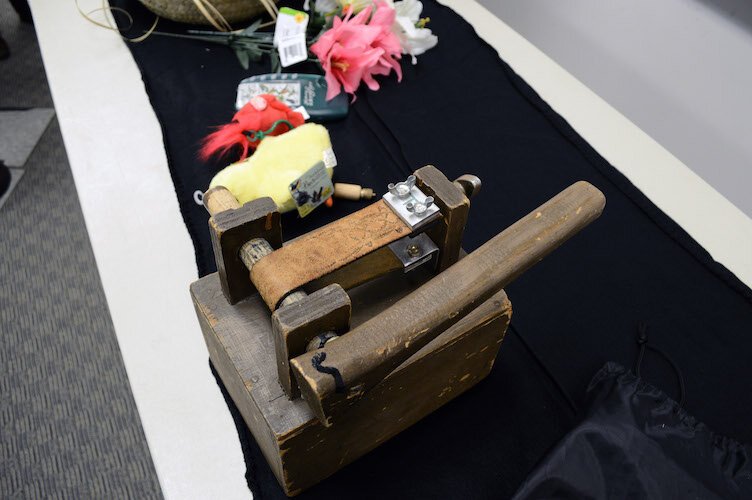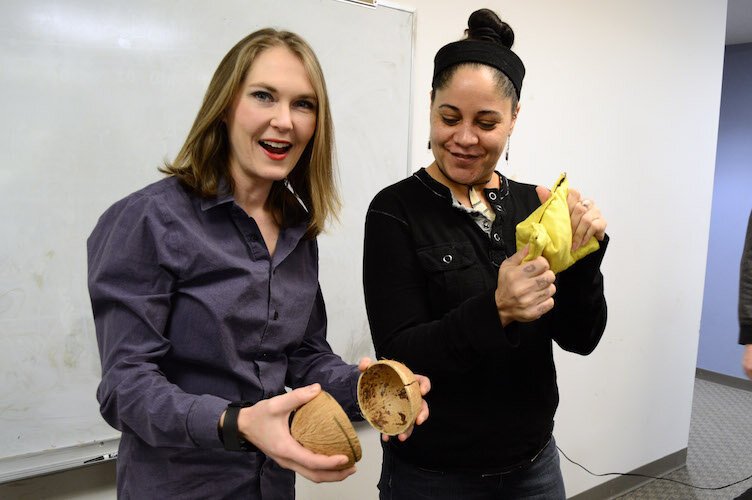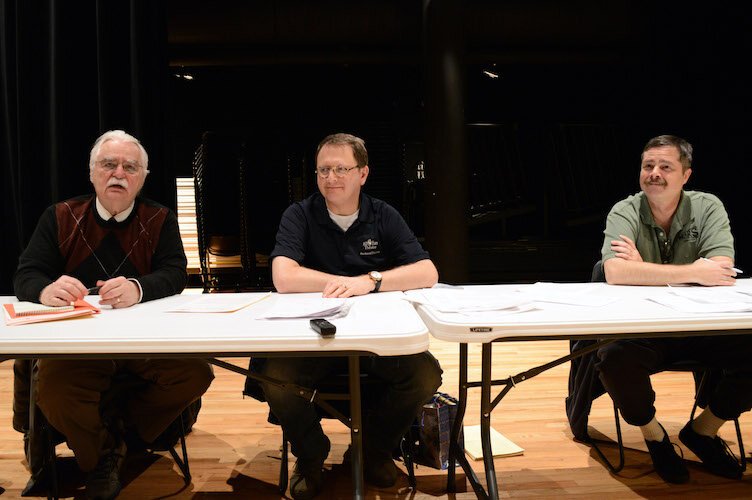All Ears Theatre harnesses the power of imagination to draw in listeners
As All Ears Theatre enters its 19th year it still knows how create a whole world in your head through sound.
It’s all in your head. And in your ears.
The longevity of All Ears Theatre, gearing up for its 19th year, shows that radio theater still has the power to captivate.
The Kalamazoo tradition records live in front of audiences at the First Baptist Church of Kalamazoo. It later broadcasts on WMUK (102.1 FM).
Radio dramas, comedies, and mysteries ruled home entertainment from the 1930s to the 1950s. All you kids might not know, but back then there was no TV, cable, satellite dish, video games, computers, smartphones, internet, wifi, Facebook, Instagram, Netflix, Hulu, Disney+ ….
Wow, we’ve got a lot of entertainment options. So why put all of your attention — and the magic doesn’t happen if you’re only half-listening, the people of All Ears say — into a radio program?
“Because it is a beloved art form that still has relevancy in today’s world,” All Ears founder Don Ramlow says. “The beauty of it is, you don’t need to have a billion-dollar budget to put on a show, because the billion-dollar budget is in your head. Create any image you want, anything that would work as far as the show goes. And the beauty of it is, it’s all just from a person’s voice.”
Making images with sound
Well, voice plus a bit of music and sound effects.
On a Saturday in early December, All Ears Theatre production coordinator Sharon Mais was stabbing produce at a sound effects workshop.
She was telling the class how she needed to find the perfect sword-into-guts sound for a production of “Macbeth” a few years ago.
“I went to the store, I bought steak. I found out a steak has no sound,” Mais said.
She kept picking up items at the store to stab. “My poor family had weird food for a week. Every time my husband came home I’m there stabbing things.”
Apples, watermelon, muskmelon, heads of lettuce, “Finally, cabbage.”
Mais stabs a cleaver into a head for the class — the sound is about as disturbing as the other sound effect for wounding, the breaking of celery for breaking bones.
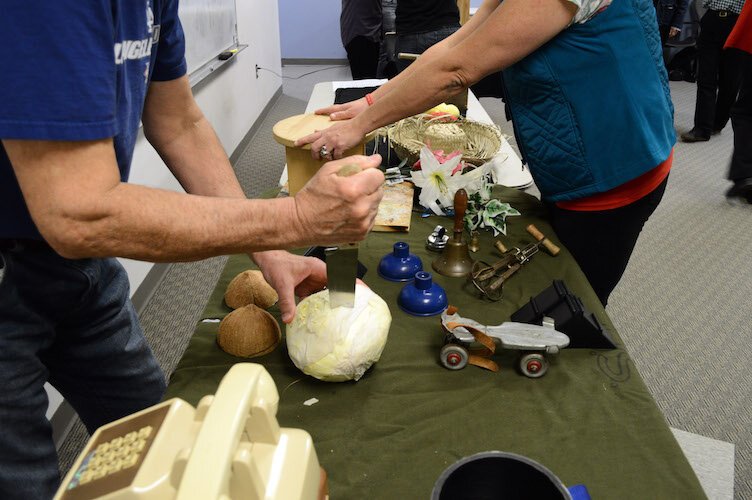
Thanks to the high-intensity microphones they use during recordings, during her reproduction of a mortal stabbing in “Macbeth” Mais saw the audience jump. “Several women, I don’t want to say they screamed, but they went ‘Ah!'”
It was a proud moment for Mais. “Yay! I did that! That was great!”
Foley artist hopefuls at the workshop got to try their hand at walking through grass (rustle the fronds on the rim of a woven hat, or rub artificial flowers together), horse hooves (coconut halves, as any Monty Python fan knows), thunder (the Thunder Box, a cable hanging from a plastic drumhead).
Birds cries could be from the “cheat” of an electronic bird call maker, Mais says, toy birds or simply from the foley artist whistling. Sometimes the mouth is all that’s needed — she has husband and All Ears co-producer Jeff Mais do the “Pop!” and “dook dook dook” of a bottle opening and being poured.
Workshop groups gathered to read a script of a couple of bad guys preparing an ambush. How are they going to make the sound of guns picked up out of a box? They decide to clank a metal roller skate and egg-beater together. With the eyes closed, the metallic sounds could be a couple of old pistols.
These are some low-tech effects, but they get the job done, Rick Fontaine, All Ears’ other co-producer, says.
“It’s my favorite performance art because the audience is so engaged,” he says. “As an audience member, you’re the one bringing the crazy contraptions in your head, you’re the one bringing the crazy settings, you’re the one bringing the crazy costumes.”
They regularly get a large audience for the live tapings, but that audience isn’t seeing a regular stage play. “All you’re seeing is six or seven folks up front, doing their silly, scary voices, and looking at a table of stuff (sound effects material) that doesn’t make sense, and yet it’s taking you there,” Fontaine says.
When he was a kid, his mother introduced him to cassettes of Jack Benny’s radio show. That led to an obsession that got him into radio. “In my naive little head, I thought maybe I could bring that back to radio.” Fontaine was in radio for 20 years, but had no luck in doing radio theatre locally, until he found All Ears. “There are maybe five cities in America where this is still going on, and I happen to live in one of them,” he says.
‘Be over-the-top’
Ramlow, Fontaine and Jeff Mais recently held auditions for the first three All Ears productions of 2020. Around 15 actors — All Ears regulars and some new voices — showed up.
Mais, directing “Sherlock Holmes and The Red-Headed League,” asks for a group to read. He’s looking for “a good English accent, or even an acceptable English accent.”
Martin Burch, an All Ears player since 2003’s “Dead Men Don’t Jaywalk,” seemed to nail the accent and character of Holmes. Others reading the other parts weren’t quite getting the accent right or were a little too subtle.
Mais tells them that this is radio, so they can’t flesh out the character with mannerisms, facial expressions, etc. “Everything is about the voice. Be over-the-top.”
Next, “The Ugly Duckling.” Its director, Fontaine, says the script has got “20 blessed characters, and I can cast at most eight people. If you can give me three or four voices, and with my eyes shut I have no idea that it was you every time, that’s what I’m kinda looking for.”
Eight people come up and fill the room with cartoonish voices for ducks, geese, a cat, a turkey, and the titular character who (spoiler alert from Fontaine) “isn’t really a duck.”
A comical kids’ fable is perfect for over-the-top nutty voices. But the next script called for a character a bit more deadpan, the private detective star in Ramlow’s original “Ira Park, Detective, and His Hawaiian Mystery Adventure.”
Director Ramlow says he’s looking for portrayal in the style of a Humphrey Bogart. An actor reads the part laconic and cool, drawing out and taking his time with the dialog — and that’s not quite right for radio. “Speed it up,” Ramlow tells him. In radio, “timing is everything.”
After auditions, Burch says he’s always been fascinated by dialects and may have been influenced by “a misspent youth, watching cartoons, hours on end.” In addition to Sherlock, he also demonstrated that he could do a number of wacky voices when trying out for “Ugly Duckling,”
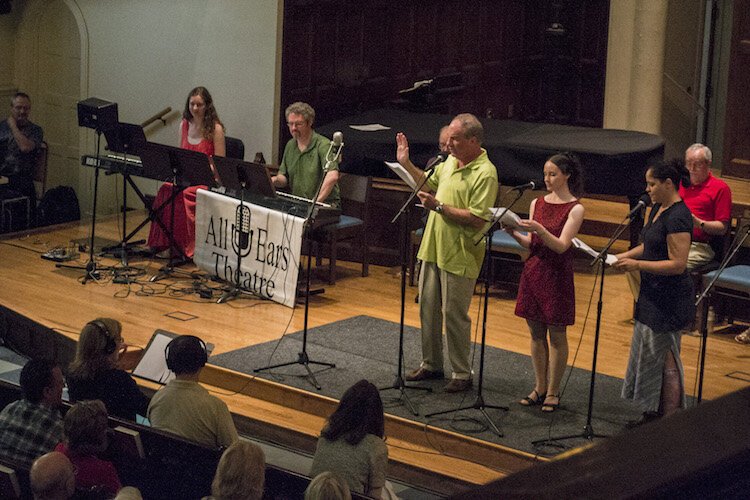
“In the end, though, I always hope it’s more about the character and less about ‘doing a funny voice.’ It’s one thing to be able to pitch your voice up or down, or put on a dialect. It’s another to actually understand what the words mean and, within the scope of 25 pages, understand what a character wants,” Burch says.
Burch has tried to be in at least one All Ears production since 2003. “The main thing that keeps me coming back, though, is the core group. They’re just a great bunch of people to work with. Very few egos, you know, and everyone gets along. Or if they don’t, I guess I don’t know about it!”
After auditions, we ask the directors if maybe the most-hammy actors work best?
“Not always, but frequently, hammy types tend to float to the top as it were,” Mais says. “Because they’ve got all that animation naturally. Other people, they can bring it. Sometimes you get that mild-mannered person who just suddenly pops off with these interesting voices. That’s always a rare treasure when that happens.”
Some of their actors are also on the local stage, but others just appreciate not having to look right for a part, nor spend all that time in rehearsals demanded by stage productions, the directors say. Only three rehearsals are done for each All Ears play, and no one needs to memorize lines since scripts are always used in performances.
Ramlow points out that radio theater “allows people to portray new characters easily without having to worry about the physicality there. It allows them to step out into roles that they might not normally do if they were in a stage environment.”
The audience is part of the team
Ramlow says that the audio magic can only happen if they work as a team. “It is a partnership with everybody. It’s a partnership with the writer, the musicians, the sound effects and the actors, and even the director. We all have to work together.”
And the listener has to play a part, too, Fontaine says. “It’s an art form that doesn’t really accept a passive audience. You have to be active. Needing the imagination there means that you as an audience are more actively participating in the communication.”
Ramlow has been the driving force behind establishing radio theater in Kalamazoo since he had the notion in 2000.
After two decades, he’s handing it over. “A couple years ago I started phasing myself out of All Ears, because I think it’s important for new ideas to come into the process.” Fontaine and Mais, he says “are the perfect ones to take my place and allow All Ears to continue to grow.”
Did Ramlow think it would last this long? “No. Quite honestly, I did not. And when I talk to some of my professional people who work in the business around the country, told them what I’m doing, they said, ‘How many years has this been going on?!?’ They couldn’t believe that any community had radio productions going on almost 20 years.”
For the All Ears performance and auditions schedules, see this.

